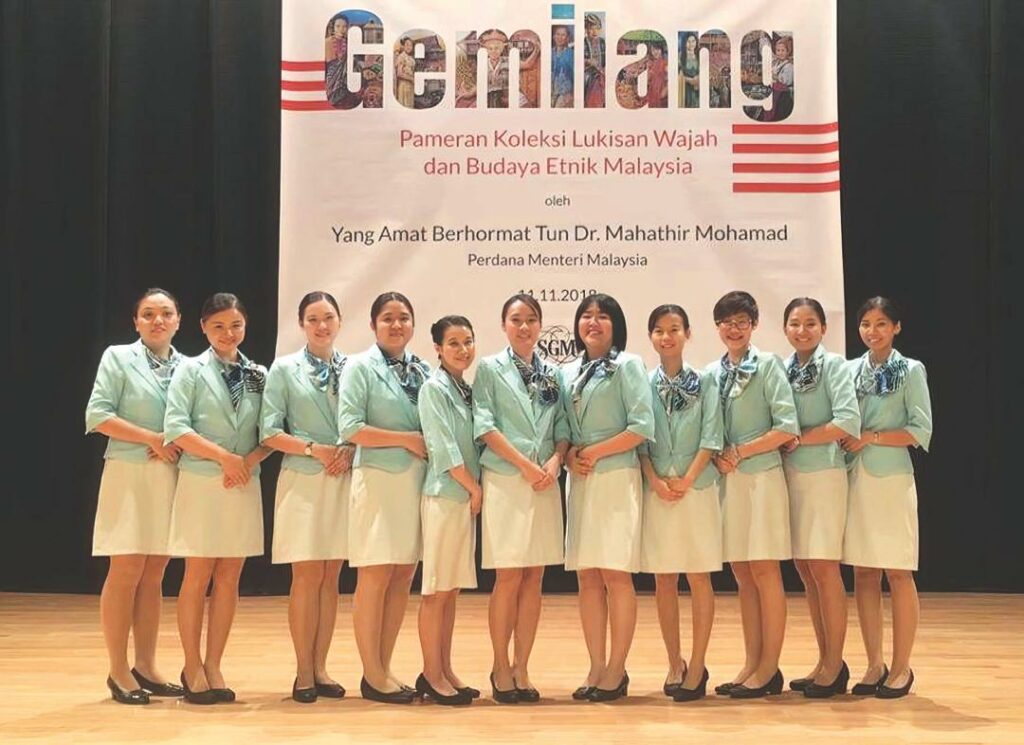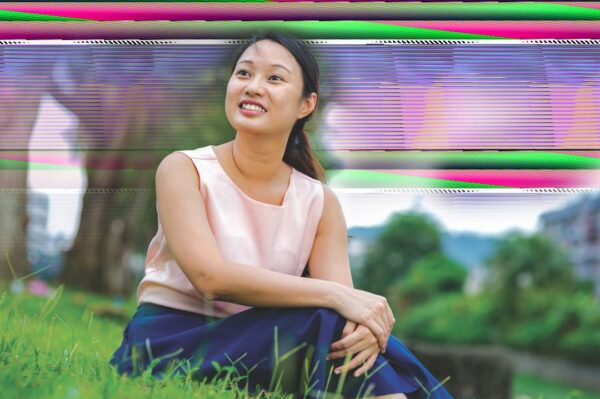
“Good morning!” “Welcome!”
With bright smiles and cheerful voices, a young women’s division (YWD) member and Byakuren group members stood outside the venue, welcoming fellow SGM members to a meeting. The Byakuren group (White Lotus Group) is a volunteer group within SGM, made up primarily of Young Women’s Division members who support the smooth operation of meetings and events. Looking at this group of young women dressed in light turquoise uniforms beaming with smiles, the participants could not help smiling along.
This YWD member’s name is Hon Pue Kuan. Since secondary school, she has been on duty together with her seniors, learning how to safeguard our castles of Soka. However, Pue Kuan, who had low self-esteem and regarded herself unfortunate, felt uncomfortable whenever she was around other people. It was not easy for her to keep smiling on duty and respond politely to participants.
However, seeing the heartfelt joy and warmth emanating from seniors in faith, Pue Kuan yearned to possess a similar kind of attitude towards life. She made up her mind to transform herself into a happy, joyful SGM member.
Overcoming Self-Doubt
Born in a modest family, Pue Kuan grew up alongside three elder sisters (including twins) and an older brother. Though the family wasn’t well-off, they always had enough to get by.
Her parents did not place high expectations on her, hence she did not feel pressured to excel academically. However, perhaps because the people around her fared better in life, she always felt inadequate, resulting in self-pity, unhappiness and lacking self-confidence.
After attending SGM activities with her mother, local YWD leaders often home-visited her. She did not want to see them and often responded to their enthusiasm with stony silence, feeling that communicating with people was scary.
In truth, Pue Kuan constantly compared herself to others in her mind, but her feelings of inferiority always got the better of her. She even felt as though her existence was insignificant. This oppressive feeling lingered for a long time, until one day, she couldn’t help but ask her mother, “How can I become happy and joyful?”
Her mother replied unhesitatingly: “Chanting daimoku will bring you happiness.”
“It’s not important how you compare yourself to others but how you compare yourself to whom you were yesterday. If you see that you’ve advanced even one step, then you’ve achieved a victory.”
In order to break through the psychological bottleneck building up within her, Pue Kuan decided to give chanting daimoku daily a try, praying sincerely to become happy.
In President Ikeda’s book Discussions on Youth addressed to the youth division, there is a passage that deeply resonated with Pue Kuan, “It’s not important how you compare yourself to others but how you compare yourself to whom you were yesterday. If you see that you’ve advanced even one step, then you’ve achieved a victory.”

This guidance has changed Pue Kuan’s tendency of constantly comparing herself to others. Instead of focusing on how she measured up to others, she started comparing herself to who she was the day before. It didn’t matter if her pace was slower than others; what mattered was moving forward to the rhythm of her own life.
Later, Pue Kuan began to take part in Byakuren group duties. Through Buddhist study, chanting, and guidance from her seniors, she gradually became more confident. While she wasn’t the first to initiate conversations, she was at least able to respond, slowly developing a happy and cheerful attitude towards life.
Finding Strength in Adversity
In her first year of university, her mother was diagnosed with kidney cancer. The doctors said there was no cure, and chemotherapy and medication were the only ways to slow the spread of cancer cells. When the family felt downcast and helpless, her mother resolutely stood up—her open-hearted spirit, shining like the bright sun, swept away the gloom in their home.
Whenever her mother attended Soka Gakkai activities or received visits from fellow members, everyone remarked how she didn’t seem like a patient at all. She even encouraged others, displaying her undefeated faith and strong, heartfelt daimoku for all to see.

This reminded Pue Kuan of a Gosho passage, “Suffer what there is to suffer, enjoy what there is to enjoy. Regard both suffering and joy as facts of life, and continue chanting Nam-myoho-renge-kyo, no matter what happens.” (WND-1, pg 681) She found that this passage elucidates a life-state brimming with strong confidence and wished to live such a life.
A few months later, a doctor suggested her mother undergo surgery to remove the tumour. However, the cancer cells spread to her lungs, and her condition became critical. At that time, her mother told Pue Kuan that apart from her faith in Buddhism, she had no other wealth to pass on to her. She hoped Pue Kuan would practise Buddhism sincerely. Hearing this, Pue Kuan was deeply moved by her mother’s spirit – even at such difficult times, her mother was still thinking about how to encourage her child. Hence, she made a deep resolve to inherit the “treasures of the heart” that her mother left her.
However, after her mother’s passing, Pue Kuan felt as though she had lost her closest confidant, someone she could pour her heart out to. Fortunately, fellow SGM members frequently visited her to participate in SGM activities, keeping her connected to faith at all times. Recalling these days, Pue Kuan is incredibly grateful for their unwavering support and care.
When encountering problems at work or problematic interpersonal relationships, instead of complaining or avoiding them, Pue Kuan chose to confront them head-on through chanting. As a result, she became more confident in completing the tasks assigned to her, treated her juniors with compassion and successfully resolved various differences with her colleagues.
Practicing Buddhism doesn’t mean you’ll never face difficulties again. Instead, it gives you the courage to meet challenges head-on and turn them into opportunities for growth.
Through faith, Pue Kuan learnt to appreciate herself more, and in turn, began helping and encouraging others facing similar struggles. She resolved to develop her own “greater self,” becoming a pillar of support for those around her and repaying the kindness she had received.
From June 2023 Cosmic, adapted from an article in the January 2023 issue of Cosmic (Chinese Edition).








